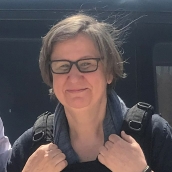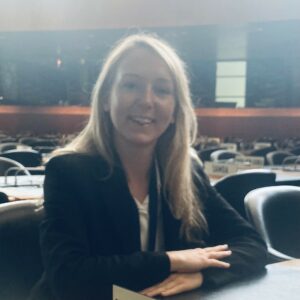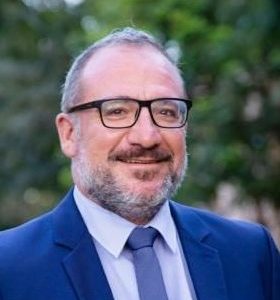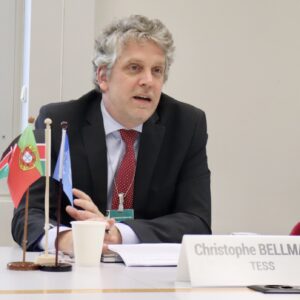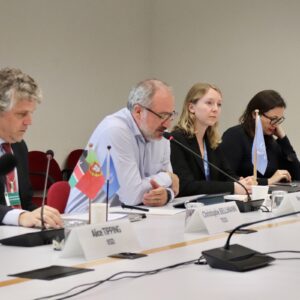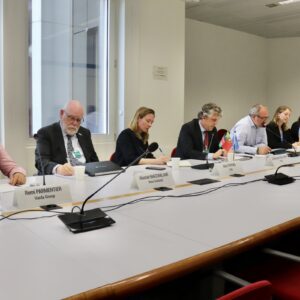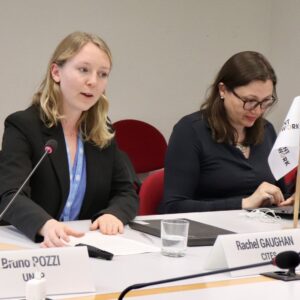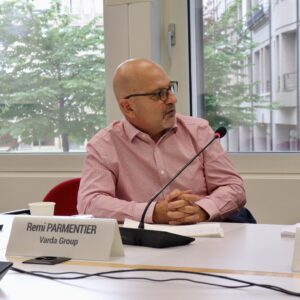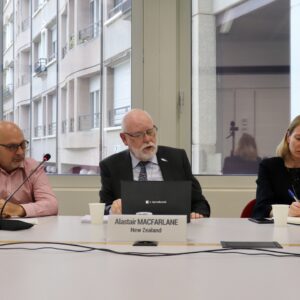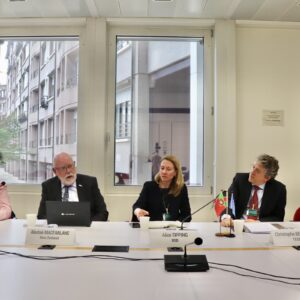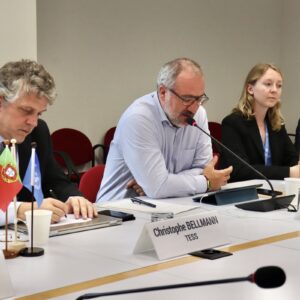Event Conference
New Disciplines on Fisheries Subsidies to Achieve SDG14 and Improve Ocean Governance | Geneva Blue Talks
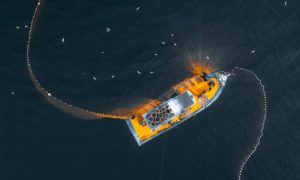
24 May 2022
15:00–16:30
Venue: International Environment House I, Room 3 & Online | Webex
Organization: Portugal, Kenya, Geneva Environment Network
In the run-up to the UN Ocean Conference (June 2022, Lisbon), the Geneva Blue Talks aim to engage stakeholders in the process by focusing on key issues related to SDG14 that are both at the heart of International Geneva and of the upcoming conference. This session provided an overview of the status of global fisheries and the role of subsidies, as well as the ongoing negotiations and expectations for upcoming international meetings, including the WTO 12th Ministerial Conference (June 2022, Geneva).
About the Geneva Blue Talks

Pursuant to General Assembly decision 75/578, the 2022 UN Ocean Conference will be held from 27 June to 1 July 2022 in Lisbon. The conference will be co-hosted by Portugal and Kenya under the theme “Scaling up the ocean action based on science and innovation for the implementation of Goal 14: stocktaking, partnerships and solutions”. It will provide a critical opportunity to mobilize partnerships and increase investment in science-driven approaches to achieve SDG 14.
In the run-up to the conference, “Blue Talks” are taking place around the world, to discuss the core issues that will be addressed at the conference, contextualizing the debate with an overview of the status quo while underlining the urgency of finding solutions to the challenges identified. The objective is to trigger the debate and wide interest in Ocean related issues and by extend active participation in the UN Ocean Conference, to promote SDG 14, the sharing of experiences and innovative approaches, and to identify opportunities to mobilize the public and private sectors.
In this context, the Geneva Environment Network is collaborating with Portugal and Kenya to propose the Geneva Blue Talks, addressing issues that are both at the heart of International Geneva and of the UN Ocean Conference, thus highlighting the contribution of Geneva to the global ocean agenda. Geneva is indeed a major hub for global environmental governance, were questions regarding the sustainability of our ocean are addressed in various processes and negotiations. Protecting our ecosystems from pollution or climate change, developing a sustainable blue economy, providing data and science solutions to help decision-making processes, or creating synergies for achieving SDG14, are some of the topics discussed in Geneva that could contribute to help implementing measure to achieve SDG14.
About this Session
The 2022 UN Ocean Conference, which will be held in Lisbon in June, is an opportunity to mobilize action toward the achievement of SDG 14 – Life Below Water. How to effectively address overfishing will be one of the core priorities of the meeting, as one of the main challenges faced by our ocean today. Indeed, more than 820 million people depend on fisheries and aquaculture for food, nutrition, and income. But the ability of our fisheries to provide jobs and nutrition is being threatened by an unprecedented crisis of overfishing and improper resource management. Nearly 90% of global marine fish stocks are fully exploited, overexploited, or depleted.
Some forms of fisheries subsidies contribute to this detrimental impact. Fishing subsidies are estimated to be as high as $35 billion worldwide, of which $22 billion directly contributes to overfishing. Subsidies also foster inequality, as they disproportionately fund big business rather than small-scale and artisanal fisheries. SDG 14.6 acknowledges the detrimental effect of harmful subsidies and the need to eliminate them to achieve a sustainable blue economy.
Regulating these harmful subsidies can assist in reducing unfair competition in accessing fisheries resources at sea, whilst at the same time seeking to safeguard fisheries resources, livelihoods and ecosystems. Since 2001, important negotiations are held at the World Trade Organizations (WTO) to eliminate subsidies for illegal, unreported and unregulated fishing and to prohibit subsidies that contribute to overcapacity and overfishing. An agreement on fisheries subsidies is expected at the 12th Ministerial Conference (MC12), scheduled to take place in the week of 13 June 2022 in Geneva. The UN Ocean Conference could be an excellent opportunity to celebrate the successful conclusion of the talks and a major step towards fulfillment of SDG target 14.6.
As part of the Geneva Blue Talks ahead of the UN Ocean Conference, this event will provide an overview of the status of global fisheries and the role of subsidies, as well as the ongoing negotiations and expectations for upcoming international meetings. This event is also hosted in the run-up to WTO MC12.
Speakers

Alastair MACFARLANE
International Fisheries Management Expert, Ministry for Primary Industries, New Zealand

Alice TIPPING
Lead on Fisheries Subsidies, International Institute for Sustainable Development (IISD)

David VIVAS EUGUI
Legal Officer, Trade, Environment, Climate Change & Sustainable Development Branch, UNCTAD

Christophe BELLMANN
Head of Policy Analysis and Strategy, Forum on Trade, Environment & the SDGs (TESS) | Moderator
Video
In addition to the live WebEx and social media transmissions, the video of the event is available on this webpage.
Summary
Welcome and Introduction
Duarte BUÉ ALVES, Consul General of Portugal in Manchester
When it comes to the ocean, the news is not good. The ocean is on fire, and this is not an exaggeration. The situation is indeed very serious and critical also because that fire is not visible. The ocean is facing several problems:
- Ocean warming and sea-level rise, resulting from warming seas and melting of ice glaciers, sea-levels rise and threaten coastal communities and destroy economic services. For example, in the last 10 to 20 years, Portugal has lost 13 square kilometres of its coast because of sea-level rising.
- Plastic pollution continues to enter the ocean at an alarming rate and represents 84% of all pollution in coastal areas.
- Fish stocks overexploitation: FAO estimates that one-third of all fish stocks are caught illegally or are unreported. This means there a significant number of fish is entering the market in an uncontrolled and untaxed manner, on top of not respecting scientific quotas to preserve fish stocks for future generations.
SDG 14.6 addresses overfishing, illegal, unreported and unregulated fishing. It claims these must come to an end and be replaced by a science-based management plan to restore fish stocks and halt subsidies that contribute to overcapacity and overfishing. Nevertheless, there also is good news. Despite being sometimes dispersed, mechanisms and architecture of the global ocean governance can rely on relevant tools to stop those plagues, including through the 2015 Paris Agreement, the conference of the parties of the UNFCCC, and the Agenda 2030 for Sustainable Development. All these are complemented by the legal framework of the Montego Bay Convention. Furthermore, this year’s international environmental agenda is taking important decisions in relation to ocean sustainability, starting with the decision to develop a legally binding instrument to beat plastic pollution at UNEA-5.
To halt overfishing, the only instrument and solution to be used is control. For instance, FAO Port State Measurement Agreement can only work if all coastal countries adhere and exercise control. If this happens, it will be almost impossible to bring illegal fishing into the markets. The maritime institutional architecture is complex but as long as pragmatism and balance guide the multilateral environment, we can raise the ambition and act coherently. Hopefully, these will be the guiding principles of the six milestone events of 2022 that will contribute to an improved ocean governance:
- UNEA5, which adopted a resolution to end plastic pollution.
- The Intergovernmental Conference on Marine Biodiversity on Areas Beyond National Jurisdiction (BBNJ), an important instrument that is being developed in New York to strengthen high-sea governance.
- COP15 of the Convention on Biological Diversity taking place in Kunming, China, where protected marine areas will be discussed among other issues.
- The UNFCCC COP27 taking place in Sharm-el-sheik, Egypt.
- The 12th WTO Ministerial Conference (MC12) in Geneva.
- The UN Ocean Conference in Lisbon.
Year after year, the ocean is becoming less healthy, with less oxygen, less resilient, more polluted, more acidic, with more dead zones, and warmer. For Portugal, addressing these issues is critical since maritime issues are indeed a pillar in Portuguese foreign policy. In the last decade, Portugal has developed tools of national ocean governance which we are willing to share with colleagues through these Blue Talks and the UN Ocean Conference. These entail, for instance, the Ocean Satellite Account and the Maritime Special Planning Law approved by the Portuguese Parliament in 2015.
Finally, all these plans must be made coherent, consistent, and operational while at the same time stepping up the ambition. The UN Ocean will be guided by science and innovation and this is what we call the Road to Lisbon.
Christophe BELLMANN | Head of Policy Analysis and Strategy, Forum on Trade, Environment & the SDGs (TESS)
The 2022 UN Ocean Conference is the second one, following the first one that took place in 2017. It will involve a wide range of actors from the private sector, youth organizations, and a whole range of stakeholders who will try to coordinate the various international initiatives in the area of the sea. The main outcome expected is the adoption by consensus of a concise political declaration to support the implementation of SDG14. Hopefully, this declaration will be action and solution-oriented, as well as based on science and innovation. The declaration is still under negotiation in New York but the latest draft already contains some references to the need to end harmful subsidies. In addition to the political declaration, national and local governments, civil society, NGOs, academia, the scientific community and the private sector can and are expected to submit voluntary commitments toward the implementation of SDG14.
Fisheries subsidies are at the heart of ongoing discussions in the WTO and addressing the issue of subsidies is the most concrete and immediate contribution Geneva can do toward the achievement of SDG14. Every year, 35 billion dollars are being provided to fisheries subsidies, 22 of which are estimated to directly contribute to overcapacity and overfishing, with significant consequences on fish stocks, livelihoods and food security worldwide.
Efforts at crafting new international rules to end those harmful subsidies have been ongoing for more than 20 years and should be finally concluded by the 12th WTO Ministerial Conference in June this year. As governments try to address the last sticking point of these complex negotiations, today’s discussion provides a good opportunity to understand why these talks are so critical, what the key issues to be resolved are and what can be done to support effective implementation, if and when an agreement is reached.
The Global Challenge of Overfishing and Overcapacity
Bruno POZZI | Director, Europe Office, UNEP
Five decades ago, the world came together for the UN Conference on the Human Environment, making the connections between sustainable development and the environment. As we face the growing problems caused by the triple planetary crisis of biodiversity loss, climate change, and pollution, on 2-3 June, global leaders will have an opportunity to reflect upon 50 years of multilateral environmental action to achieve bold and urgent action.
Addressing the problem of overfishing and regulating fisheries subsidies is an opportunity for leaders to follow through on the bold and urgent action needed to address the interlinked crises. Overfishing is a sustainable development challenge, but it is also an environmental crisis affecting millions of people. With nearly 90% of global marine fish stocks fully exploited, overexploited or depleted, overfishing and improper management of resources in the ocean now threaten the lives and livelihoods of more than 820 million people who depend on fisheries and aquaculture for food, nutrition, and income. The MC12 and the Ocean Conference are an opportunity to push for the achievement of SDG targets, particularly SDG 14.6
Adopting an ecosystems approach to ocean and coastal policy and management is an essential pre-requisite in ensuring long-term healthy and productive oceans and coast, — in turn ensuring livelihoods and sustainable development of millions of coastal people and societies by large. Ecosystem-based ocean management involves for example:
- Adopting area-based management, through instruments and tools like Marine Protected Areas, marine spatial planning and integrated coastal management;
- Taking an ecosystem-service perspective by valuing and incorporating natural capital in ocean planning and decision-making;
- Addressing multiple objectives in ocean management across sector objectives and economic priorities;
- Addressing cumulative human impacts on oceans, meaning the combined negative effects of fisheries, coastal development, pollution and climate change;
- Ensuring inclusive and consultative approach to marine management by engaging relevant stakeholders in planning and decision-making;
- And applying the precautionary principle in absence of knowledge or scientific facts.
SDG target 14.2 calls for adoption of ecosystem-based approaches to ocean and coastal management, including through marine conservation, protection and restoration by 2020. Today, this target is met partially through adoption of national and regional protocols and action plans on Integrated Coastal Zone Management and national marine spatial plans. More efforts are however needed to upscale ecosystem-based management – there are increasing good examples where environmental and fisheries management objectives are achieved through joint actions between environmental and fisheries management organizations, for example in the Mediterranean.
UNEP is working toward the achievement of SDG 14 by supporting Member States to upscale ecosystem-based ocean management (1), improve trade policies including with regards to fisheries subsidies (2), and facilitate a transition towards a sustainable blue economy (3).
- UNEP is playing an active role in assisting countries adopting ecosystem-based approaches to ocean management, including through normative policy guidance, planning and decision-support tools, as well as capacity building at national and regional level, including through the Regional Seas Programme. UNEP supports the ambition of “100% ocean management” of national waters set out by the High-level Panel on Sustainable Ocean Economy.
- With regards to fisheries subsidies, UNEP, UNCTAD and FAO, with support and guidance from Member States, presented in 2019 an inter-agency Plan of Action to accelerate the achievement of trade-related targets of SDG 14 (namely targets 4, 6, 7 and b). This includes improved trade and trade-related policies that safeguard food security and contribute to the conservation and sustainable use of oceans, living marine resources and livelihoods, and support to Member states in the negotiations and implementation of trade reforms at the international and national levels.
- UNEP is actively engaged in enabling the transition toward sustainable blue economies through whole-of-government approaches, including facilitating sustainable fisheries. UNEP is pilot-testing a new Sustainable Blue Economy (SBE) Transition Framework.
This framework helps countries navigate transition pathways to sustainable, climate resilient and inclusive blue economy economies. It anchors an often conceptual discussion in a practical planning processes and steps. It also helps development of strong enabling environment, including blue economy ‘readiness assessment’. It further enables blue Financing by working with private sectors. Designed for banks, insurers and investors, UNEP and UNEP FI have developed guidance on how to avoid and mitigate environmental and social risks and impacts, as well as highlighting opportunities, when providing capital to companies or projects within the blue economy.
Embedded within the SBE Transition Framework, UNEP is developing two tools to analyze the current blue economy system and develop strategic policy to transition towards a Sustainable Blue Economy. The Blue Economy Model Framework will provide investment scenarios on transitioning to a SBE with economic, social and environmental implications of required policy interventions. These implications will reflect also when fishery subsidies are reformed/removed. The Blue Public Finance Framework will provide a tool for developing policy and planning public expenditure for sustainable blue finance by examining the national budget at the policy level.
The upcoming months will be crucial for ocean governance. Before Lisbon, the world will be meeting in Stockholm (S+50) and in Geneva (MC12). UNEP will continue to support Kenya, Portugal and other Member States and stakeholders in any negotiations and measures to achieve SDG14, stop overfishing, and improve ocean management, thus continuing to address the challenges of the triple planetary crisis.
Charlotte DE FONTAUBERT | Global Lead for the Blue Economy, World Bank
Most of the World Bank’s work on fisheries started with a series of reports called The Sunken Billions where we tried to do an economic analysis of what numbers really say about the global fishing crisis and whether or not the situation is as bad as it as it looks and where the problems lie. Based on innovative economic modelling, we found that the target ought to be a reduction in global fishing effort by 40%. With the target, a number of win-wins can be achieved. First of all, if the target is achieved, biomass will increase from 250 to 580 million tons in the water.
According to FAO figures, 30% of the stocks are overfished, which means that the more we fish them, the lower the level of the stock goes. From an optimistic standpoint, 60% are fished exactly where they should be, which is the maximum economic yield (MEY), but there is a degree of uncertainty. Again, what The Sunken Billions Reports showed is that a higher sustainable harvest level can be obtained by fishing much less. We also showed that the lending prices are also going to increase by more than 25% because stocks will be healthier, fish larger and fetch higher prices.
From an economic standpoint as a supposedly biological phenomenon yields economic and then social benefits. In terms of hard cash numbers, as these are the ones that tend to grab the attention of policymakers, we showed that an almost thirty-fold increase in the net benefits can be expected. That would be derived from sustainably globally managed fisheries. So, these are the so-called “sunken billions” and when we did the comparison to 2012, global benefits were estimated to be three billion dollars a year and these revenues could increase to almost 90 billion. With yearly variation from one year to the next, excesses of 80 billion every year can be expected. These are foregone benefits, money wasted because of overfishing. These benefits would materialize happens because the fishing cost would be lower and the fishing harvest would be higher.
These findings called for the obvious question of how much of this is driven by fishery subsidies. The figures vary from around 35 to 40 billion dollars a year, depending on how you measure them. The World Bank tried to quantify the importance of subsidies in the fisheries crisis and find some solutions to it. The World Bank has indeed focused on helping client countries to manage their fisheries more sustainably. It recognized that fisheries subsidies are a distorting phenomenon, and it is currently working on a new modeling project to redress it. This attempts to quantify what would happen with and without subsidies in three major fisheries in Mauritania, the South China Sea, and the East China Sea. Preliminary findings will be presented at the UN Ocean Conference in Lisbon.
Again, it is important to notice that the World Bank is not saying that the governments must disengage from investing in the fisheries sector, but rather need to redirect the support along a more productive path. If governments are allowed to address the unintended consequences of their investments, the fisheries crisis could receive key support in fixing it. Concretely, the World Bank is continuing to model while also having identified a key avenue of intervention: public expenditure reviews (PERs). It is striking that governments themselves do not necessarily know the extent to which they are subsidizing. Therefore, through PERs adapted to the fishery situation, the World Bank is giving governments a new tool to assess and better understand the effects of their policies.
It is important to emphasize the role of governments’ support to help cover the cost of the necessary reforms. We know that the level of fishing efforts needs to be reduced, but we also know that this is going to be socially painful. Therefore, the World Bank is willing to help governments identify ways to support this transition. Put it in a simple way, too many boats catch too few fish and thus, some of these boats will have to be decommissioned, but this will impact the lives of fishermen making a living on these boats. Therefore, the World Bank is engaged to bring the attention toward measures that we know will strengthen fishery sustainability, like marine protected areas, stock assessment, scientific research and other things that governments can do to enable this transition. The World Bank is focused on strengthening these aspects to tackle the fisheries subsidies issue.
Status and Expectations for the WTO Negotiations
Alastair MACFARLANE | International Fisheries Management Expert, Ministry for Primary Industries, New Zealand
It is important to recall that the subsidies negotiation has been on the agenda of the World Trade Organization since 2000, 22 years ago. Indeed, this is not a new issue. The mandate for the negotiations comes from the previous World Trade Organization Ministerial Conference (MC11), held in 2017, and SDG14.6. The language of target SDG14.6 prohibits certain forms of fishery subsidies which contribute to overcapacity and overfishing, eliminates subsidies that contribute to illegal unreported and unregulated fishing and refrains from introducing new such subsidies, recognizing that appropriate and effective special and differential treatment for developing and least developed countries. It should thus be an integral part of the WTO’s Fisheries Subsidies Negotiation. As MC12 is now less than three weeks away, the Fisheries Subsidies Agreement negotiations are at an intense stage. The Chair of the Subsidies Negotiation, His Excellency Ambassador Santiago Wills of Colombia, convened a week of intensive negotiations from 16 to 20 May for Fish Week. At the end of the week, Ambassador Wills was quoted in a media release from the WTO as follows “Members have adopted a positive tone and shown some new flexibility in the discussions, paving the way for decisions to be made, to close the remaining gaps ahead of the twelfth ministerial conference next month. Overall, I sensed a positive vibe during this week’s meetings and noticed Members’ willingness to constructively engage in discussions. I was encouraged also to see some movement and positions as Members further expressed a desire for an effective and ambitious outcome.” He reported that much of the work over that week of meetings in different configurations focused on some of the outstanding issues in the draft agreement that need to be resolved, such as:
- The treatment of non-specific fuel subsidies;
- The balance and ambition related to overcapacity and overfishing, including special and differential treatment for developing and least-developed country members,
- The issue of reflagging of fishing vessels to flags of different members or other jurisdictions;
- Transparency requirements related to forced labor and territoriality.
According to Ambassador Wills, to reach an agreement before MC12, we must get this done not later than 3 June. Indeed, it is now or never for a fish agreement. We need to do everything we can to ensure the agreement is achieved now. The prospects of an agreement at MC12 are better than they ever were. But that optimism must be severely caveated, as it is by no means a foregone conclusion. We are currently working with the text that would have gone to ministers in November. The work we are doing now is aimed at making it more consensual and to reduce the number of points for MC to a very small number before they must decide to adopt or reject. So, at the concluding session on Friday, Ambassador Wills noted that there needed to be a significant increase in engagement among members to common ground when sessions resume on 30 May. The work of fish decision week will require looking horizontally across the text to ensure coherence and balance. The whole text is in square brackets for ministers to make final decisions. Members are being challenged to find the common ground that will enable as many of the internal square brackets as possible to be removed and present ministers with a clean text. It is reasonable to anticipate that there will be a revision released in the week of 6 June. In the case next week an agreement is reached, the next steps are envisioned as follows:
- Lawyers get a hold of the document and turn it into legal language, hopefully preserving Members’ interpretations.
- The text is then open for Members and that may take around three years before the agreement enters into force, since Members will require to make regulatory and legislative changes to be able to meet the requirements of the agreement. It is best practice not to adhere to an agreement before you have the capacity to deliver it.
- The operational processes for the agreement must be established. It will not be an addendum to the subsidies and countervailing measures agreement. It is a separate agreement with its own character and it will require the establishment of its own meeting processes, including a committee elected by Members.
- The agreement has a review clause the committee will be required to review not later than five years from entry into force.
Alice TIPPING | Lead on Fisheries Subsidies, International Institute for Sustainable Development
As the WTO negotiations are targeting especially SDG14, these represent a key input to the UN Ocean Conference. All those involved in the negotiations are working hard, losing their voice in some cases, to ensure that the negotiations can move ahead and reach a successful outcome at MC12. Two key elements that have become part of the WTO negotiations refer to specific points of SDG14.6.
- The idea of eliminating subsidies that go to illegal, unregulated and unreported fishing.
- The idea – drawn from the WTO ministerial mandate from 2001 – of prohibiting those subsidies that contribute to overcapacity and to overfishing.
Overfishing has huge costs because when fleets are too large, they catch too many fish that ends up depleting the stock, contributing to the marine ecosystems and economic sector fragility. Indeed, fishermen struggle to make a living and they become more dependent on subsidies, which is why they remain as sticking points to be negotiated. WTO Members are discussing three main substantive rules:
- Prohibition of subsidies from being given to vessels that are the subject of an IUU (Illegal, Unreported, Unregulated) determination. According to this, when a government, a coastal state, or a regional management organization determines that a vessel has engaged in IUU fishing, that vessel is prohibited to receive subsidies for a period of time. Interestingly, the text established that subsidizing Members decide this duration, granting balance in the process.
- Prohibition of subsidies to stocks that are already overfished. If the biomass is already depleted, Members cannot fish it unless they have in place management measures to help rebuild that stock.
- Prohibition of subsidies that contribute to overcapacity and overfishing, is highly linked to SDG14.6. dedicated to the idea of. A list of subsidies that are most likely to contribute to overfishing and overcapacity has been drawn based on their connection to fuel subsidies. Fishing is an extremely fuel-intensive activity: the cheaper fuel, the more and the further it can be fished. Thus, Members agree not to provide fuel subsidies, unless they have in place management measures to keep the stocks at a sustainable level.
The first two rules in the text seem to be stable, as they are very carefully crafted and balance compromises. It is therefore unlikely they will be reopened for discussion. Additional interesting rules focus on subsidies for fishing outside a member’s national waters. This is due to the conviction that subsidies that are designed to push fleets into the high seas or into another country’s waters are very likely to contribute to overcapacity and contribute to overfishing. Another idea that has been highly debated at WTO during Fish pivots around the idea of prohibiting subsidies to vessels that do not carry the flag of the government subsidizing them.
As these rules and prohibitions already hint, balance is a very important part, especially in the article that refers to special and differential treatment for developing country members. This article is still an unresolved item of overcapacity and overfishing negotiations. The special and differential treatment paragraph contains various exceptions tailored to the specific question of fishing and the specific question of fishery subsidies. For instance, artisanal fishing within 12 nautical miles is subject to permanent exception, granting balance. Nevertheless, some uncertainty over whether that geographical will stick has been expressed. Another specific exception targets WTO Members that catch very little – less than say 0. 7% of a global catch, the so-called di minimis exception. On the one hand, Members that play a significant role in the global fishing space are granted a transition period for commercial fishing subsidies, basically being given access to the artisanal exception. On the other hand, for the subsidies they provide to commercial-scale fishing, Members would have a transition period of X number of years. The length of that transition period is open to debate: some Members favor a period between five to seven years, while others strongly favor a much longer transition period.
Therefore, one of the key decisions Members will have to make is whether they are comfortable with the balance between the list of prohibited subsidies and the exceptions provided for developing Members. Again, this decision should also reflect Members’ satisfaction with those rules and exceptions in terms of establishment of discipline and fulfilment of the WTO mandate and of SDG14.6. Again, these decisions have been equipped with appropriate and effective flexibilities for developing countries, which may feel that subsidies they provide to their fishing industry will be extremely difficult to reform. Indeed, flexibility to make that transition politically feasible can be expressed both in time and/or in actual substance. Therefore, the appropriateness of the special and differential treatment and of the balance is still subject to decisions, as much as how additional prohibitions will be designed. Additional prohibitions entail those focusing on subsidies designed to push vessels into the high seas or into other Members’ exclusive economic zones. There are politically important for many Members but are also part of the overall structure of an extremely global industry. Various issues could be discussed, but hopefully, the two main decisions outlined will be achieved during Fish Decision Week next week.
Remi PARMENTIER | Founder and Director, Varda Group & Adviser to Friends of Ocean Action
Friends of Ocean Action is a member of the Stop Funding Overfishing coalition, made up of almost two-hundreds NGOs. This group supports the proposal tabled by Ambassador Santiago Will, despite being not perfect. Still, it is time to move on. We have been waiting for this decision for more than 20 years. SDG14.6 was due to be achieved by 2020, and not 2030 like the majority of SDG targets, because of its urgency. Prohibiting harmful fishery subsidies is the most single important step that can be taken now by the international community to protect marine biodiversity. It is unquestionable that WTO members have run out of excuses. The 2020 deadline could not be achieved because of the outbreak of the COVID-19 pandemic, but now no impediments should stand in the way of negotiations. Moreover, it should not be the lack of a perfect proposal of perfect consensus be the enemy of the good. At this point in time, we must go with the good and move on. Members should not wait for the entry into force of the agreement to start implementing it.
It will be an embarrassment if the WTO goes to the Lisbon UN Ocean Conference admitting it has been unable to reach a consensus. We must implement discipline and respect the given timetable, reminding that SDG14.6 was to be delivered by 2020. Therefore, there are no more excuses and now is the time to act.
Addressing Overfishing in Other Multilateral Fora
David VIVAS EUGUI | Legal Officer, Trade, Environment, Climate Change & Sustainable Development Branch, UNCTAD
The data based on real notifications by Member States shows the political influence of the process on what countries do in relation to funding their fishery sector with public resources. The highest fisheries subsidies, amounting to about 12 billion, were distributed from 2010 to 2014, and then started to decrease. This could be a consequence of advancements in WTO negotiations, the SDG14 mandate, and European Union and Chinese reforms that were being implemented. This reached a decrease from 12 to almost 9 billion. Still, since 2016, the number of subsidies started increasing again in a worrisome trend, making a WTO Subsidies Agreement timely needed. Estimates seem to indicate that there will be an upward trend if strong action is not taken. This will result from the pandemic crises, where significant resources were being given to the fishery sector to sustain the incomes of fishermen that were not fishing during the confinement period. On top of this, the current high fuel prices are contributing to the situation. It may not be evident to many, but if subsidies are not regulated now, they will be difficult to control in the near future. The main subsidizers is China, followed by Japan, the United States and the EU. The figures for the EU might be an underestimate because many EU Members failed to notify the OECD. Developing countries are also on the rise. The date we have include fishery support to the entire sector, including both harmful and good subsidies.
By comparing fisheries and analyzing it against exports and share of world catch it is evident that countries subsidize for different reasons. In some, subsidies have a stronger link with trade, as in the case of Norway and the US, while in others the link is stronger with the catch and internal demand (e.g. China, Japan, and partially the EU). When entering negotiations, it is important to bear in mind whether countries are subsidizing for export-related purposes or rather to feed their own population.
According to OECD data from 2016-18, an average of 9.4 million, and going up, is to support fuel. Vessels and gears are also among those considered most harmful, but OECD countries already introduced some level of reform in relation to these. Still, there is a lot to do to try to phase out and transition to more sustainable areas, being neutral or having social purposes, like income or infrastructure. It is important to remind that these are notifications by the countries themselves, thus it may not be a transparent representation of the situation, making a reform significant needed now.
The three-pillar provisions mentioned by Alice Tipping have been balanced with flexibility, especially on the restoration of stocks and sustainability management. In that sense, special and differential treatment do not represent an escape clause or an exception, these enable countries to comply and apply the provisions in the near future. Despite being difficult, this agreement will provide Members with political benefits. The negotiations are linked to other international processes related to ocean governance, which outcome is dependent on this agreement.
- The negotiations on Marine Biodiversity in ABNJ, include several layers: the issue of marine genetic resources, area-based management including marine protected areas, transfer of technology, and impact assessments on activities at high seas. These might look not evidently linked to fisheries, but marine genetic resources are key to the restoration of stocks, sea ranching and nurseries. Genetic resources are going to be confirmed and entered for a co-culture, which patents are multiplying from almost zero in 2000 to more than ten thousand per year in 2015. For area-based management, the idea is that marine protected areas will define many of the conservation areas, requiring clarification on the different types of regulatory conservation areas. The negotiations on technology transfers will be important to facilitate more sustainable maritime fisheries.
- The UN Ocean Conference. Interestingly, the initial draft of the political declaration on fish subsidies does not mention SDG14.6; trade; maritime transport and many of the sustainable economic sectors. Therefore, FAO, UNEP, together with the UN Department of Economic and Social Affairs (DESA) must support missions in New York to include these elements in the political declaration. During the conference, there will be an interactive dialogue on management fisheries, produced by FAO and UNCTAD in coordination with many stakeholders, which include targets 4 and 6 of SDG14. This has included all the issues on fish subsidies to explain to Members what the possibilities and actions to be taken are. The interactive dialogue may give recommendations and most importantly it will happen just 15 days after the MC12, where an agreement will be hopefully achieved. If an agreement is not reached, it will be the occasion to debate the next steps. This might include an extension agreed upon in WTO, or else the implementation of SD14.6 will come back to the UN side as a separate process. The Ocean Conference may give advice or recommendations since it is not a decision-making body, but SDGs would then have to be discussed at the 2022 High-Level Political Forum.
The 4th UN Oceans Forum in Geneva in April 2022 provided the following recommendations :
- To adopt and sign a WTO fisheries Subsidies Agreement supportive of SDG 14, with due attention given to addressing the burden of obligations between Members and clarifying the implementation process.
- To identify and implement policy and technical changes ahead of the entry into force of the agreement. These entails assessing policy, technical and legal gaps and changes that will be needed. The IISD has been done a wonderful job there, but the implementation will be a very challenging phase, because this process is unprecedented. This required substantive investment in data collection, analytical tools, and science-based fisheries capacities. The challenge also lays in delivering all the notifications and transparency, and UNCTAD is ready to provide technical assistance.
- To disavow the subsidization of vessels fishing outside the country’s Economic Exclusive Zone.
- To provide adequate investments in data collection and analysis toolsto support evidence-based fisheries management, implementation, & enforcement.
- To implement comprehensive and transparent regulations, policies and tools to fight IUU fishing
- To put in place adequate technical assistance and capacity development programs by FAO and UNCTAD,to support Members’ implementation of the fisheries agreement to be agreed at the 12th WTO MC
Rachel GAUGHAN | Legal Consultant, CITES Secretariat
The Convention on International Trade in Endangered Species of Wild Flora and Fauna, or CITES, is a multilateral legally binding agreement with 184 Parties which was signed on 3 March 1973 (a date which we now celebrate as WWD). It regulates trade in specimens of over 38,000 species of animals and plants. Many people associate CITES with elephants, tigers and rhinos – but it actually covers an increasing number of commercially exploited fish and other marine species, as well as species which are unfortunately often bycatch of commercial fishing. Species that are covered include cetaceans, clams, corals, sea horses, and in recent years more and more sharks and rays.
CITES is a dynamic instrument and the structure of the treaty includes three appendices setting out listed species according to how threatened they are by international trade. When it’s proposed that a new marine species should be brought into the scope of the treaty, the proposal must be first assessed against agreed scientific criteria, with technical advice provided by an FAO Expert Panel, so we can ensure traditional fisheries management and other perspectives are fully considered, before a decision is made at the CITES COP.
The CITES regime and the fisheries sector interact whenever there is an international trade transaction, involving a CITES-listed aquatic species. Worth noting that CITES regulates trade in specimens from areas beyond national jurisdictions as well as between states. Other panelists have made reference to the challenges that are linked to harmful subsidies, such as overcapacity, overfishing and IUU fishing. The negotiators are working hard to find solutions to these challenges, and at CITES we are also working to address them, where they impact on listed species. It is very valuable to have this opportunity to come together and reflect on the complementarity of these processes in the lead up to the Oceans Conference in Lisbon.
Looking first at IUU fishing, CITES appendix II species are allowed to be commercially traded, as long as the trade is legal, sustainable and reported. For the export of CITES specimens, the exporting country needs to be satisfied that a specimen was not obtained in contravention of the laws of that state or any relevant regional fisheries management organisation – namely it is legal. The trade must not be detrimental to the survival of the species in the wild – namely it is sustainable – and this involves a science based non-detriment finding. The trade must be reported to the Secretariat, who makes the information publicly available through the CITES Trade Data Base – reported. Transit and importing States need to satisfy themselves of the necessary permits, and cannot import a CITES specimen unless it is accompanied by the required permits. So the Convention imposes obligations across the fisheries supply chain – involving source, transit and destination States. We would say that CITES trade is therefore the antithesis of IUU – CITES compliant trade is LRR – legal, reported and regulated!
CITES is also intrinsically impacted by the challenge of overexploitation, which can occur as a result of certain subsidies. Overexploitation may:
- Create a situation where the overexploited species begins to meet CITES scientific criteria for listing, so that if proposed and agreed by the COP, the species could end up being brought under CITES trade controls; and
- Furthermore where a species is already listed in Appendix II and CITES rules, as mentioned, require a ‘non-detriment finding’ before specimens can be traded, then overexploitation, especially where unreported, makes it very difficult for national authorities to produce that non-detriment finding to evidence that wild stocks can be sustainably harvested – this could be due to a lack of reporting muddying the waters on the actual take level, or simply due to evidence of overuse.
- Overexploitation can ultimately lead to trade suspensions under the CITES regime via our review of significant trade process, or indeed through other CITES compliance measures.
So CITES works to combat the result of certain subsidies, even though we don’t regulate the subsidies themselves, and it’s clear CITES rules and processes will continue to operate in a complementary fashion to new disciplines that are being negotiated, contributing to the shared goals of conservation and sustainable use of aquatic species. There are of course implementation challenges faces by exporting countries in meeting the CITES requirements I’ve described for trade in commercially exploited aquatic species. The Secretariat is deeply engaged in capacity building to assist Parties, in particular developing countries, to overcome the challenges and to facilitate sustainable ocean-based economies, for example on queen conch in certain Caribbean island states we are working to support parties to take the right steps to lift trade suspensions – in partnership with UNCTAD and OECS.
Through our national legislation project, we support drafting of legislation that meets CITES requirements. Through joint working with important partners such as UNCTAD and FAO we contribute to implementing science-based management plans to rebuild overfished fish stocks to sustainable levels. We are currently delivering a series of workshops jointly with FAO to promote cooperation between CITES and fisheries authorities within Parties’ domestic administrations to increase understanding of the regime, why it is relevant and how it should be implemented in the fisheries sector. The next is again with Caribbean states at the end of this month. CITES Parties have also adopted resolutions on livelihoods and engaging with rural communities and the Secretariat ensures this vital aspect is factored into our capacity building activities, for example on training. We are always open to more collaboration with our partners.
To sum up, CITES plays a rather specialized role in working towards fulfilling SDG 14 and we certainly have shared goals with the discussions taking place at the WTO. The challenges around lack of reporting and overexploitation, often linked to harmful subsidies, are familiar to us. We know the importance of partnership in this space, whether with UNCTAD, FAO, WTO or others who we will meet again in Lisbon, and we wish the negotiators and Ambassador Wills every success in Fish Decision Week.
Open Discussion
Q: What can be said about subsidies to small-scale artisanal fishing versus subsidies to industrial fishing? How is it reflected also in the decisions?
Remi PARMENTIER: It is estimated that about 80% of all fishery subsidies go to industrial fishers, to the detriment of the small-scale ones. One of the means of implementation of SDG14 is improving access to resources and to markets for the scale fisheries. So, unless harmful fishery subsidies are eliminated, this will not happen. This also is an issue of social justice as well as an environmental issue. Eliminating harmful fishery subsidies is very important in the overall context of the SDGs, because approximately 22 billion US dollars per year which are used to do the opposite of what the majority of the is the SDG14 targets tell governments to do. This sum of money would be much better used for positive subsidies. For example, for monitoring, control, scientific research, designation and management of marine protected areas and so forth. So, this is really an existential crisis, not just for the WTO but for sustainable development as a whole.
Conclusion
Q: Assuming an agreement is reached at the WTO, what do you expect from the from the UN Ocean Conference?
Rachel GAUGHAN: Looking towards the Lisbon Conference, we are certainly looking forward to the opportunity to have more discussions like this where we can focus on the complementarity between the various processes that are going on. We are happy to take this opportunity for promoting implementation of CITES towards sustainable and traceable ocean trade.
David VIVAS EUGUI: My key message to Member States is to not be afraid. A WTO subsidies agreement will be good for all. Positive subsidies for sustainability can still be done and will sustain livelihoods and replenishes all the oceans. Small scale fishermen need help to become more sustainable. Therefore, I hope the UN Ocean Conference can make a deep call for implementation of WTO agreement as soon as it is agreed.
Remi PARMENTIER: I would hope that WTO members do not want to look like the emperor that wears no clothes.
Alice TIPPING : It really does feel like it is now or never on this agreement. I cannot imagine a situation where we would have another opportunity to get this done. It is impossible to imagine to ever get this close again, considering the current confluence of political interest, UN interest, Member States, proximity on the actual issues.
Alastair MACFARLANE: Some of the attention within at the conference can also go towards the question of implementation and capacity-building. The Director General has an initiative within the text for coordinating a fund to assist Members in their challenges, particularly developing country Members. While on the one hand the possibility for smaller producers to not participate in this agreement is an option, it is really something that with capacity-building should not be encouraged. Indeed, we should hope to have as many Members as possible parties to this agreement.
Charlotte DE FONTAUBERT: We are conscious that this agreement is going to be costly, difficult and will require resources. That World Bank stands ready to offer its resources and technical expertise but also some financial resources.
Bruno POZZI: Managing to get rid of several very harmful subsidies would be a strong progress. In UNEP, we classify any fossil fuel-related subsidies as harmful. It is necessary to cut them and to channel the money used for these to other means. That money should be invested into restoration, conservation, and protection of the ocean. This will probably allow us to achieve many of our goals. It takes a lot of political courage, good data and scientific support. These can be strengthened, but now it is time for action.
Duarte BUÉ ALVES: The three Blue Talks organized in the UK gave me the impression that expectations are very high, especially among young generations. They are waiting for decisions and solutions. As one of speakers in our events said: “no gesture is too small.” Everybody must be involved. No gesture is too small because the ocean is too big to fail.
Christophe BELLMANN: The time is now, and we look forward for a UN Ocean Conference in Lisbon that will be welcoming an agreement and start thinking about implementation.
Documents
Gallery
Links
- Global Response to Overfishing | Regularly updated resources page
- Negotiations on fisheries subsidies | WTO
- Factsheet: Negotiations on fisheries subsidies | WTO
- Regulating Fisheries Subsidies | UNCTAD
- Stop funding overfishing | IISD
- Fisheries subsidies | IISD
- In Focus: A Draft WTO Agreement to Curb Harmful Fisheries Subsidies | IISD | 7 April 2022
- FAO activities in relation to CITES and commercially exploited aquatic species | FAO
- Video Message from H.E. Amb. Santiago Wills of Colombia : WTO “Fish Week” | 12 May 2022
- Fisheries subsidies deal: Why we need it and how to implement it | UNCTAD | 28 March 2022


